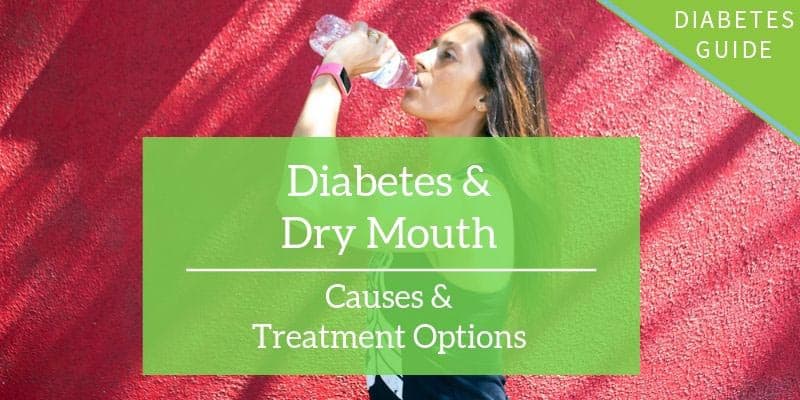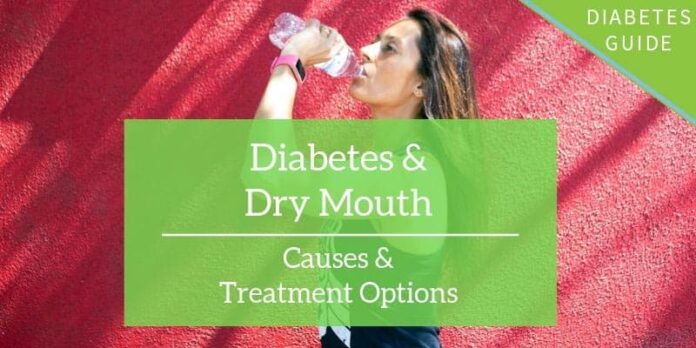While anybody can have symptoms of a dry mouth now and then, a dry mouth in people with diabetes can be a sign and cause of something more serious.
If you’ve been feeling as though guzzling a glass of water doesn’t do anything to improve your dry mouth, this isn’t something you’ll want to ignore.
In this article we’ll talk about why having diabetes can leave your mouth feeling constantly dry, and how a constant dry mouth can cause other serious issues in your mouth.

What is dry mouth in people with diabetes?
In a nutshell, dry mouth is exactly what it sounds like: your mouth is struggling to produce adequate amounts of saliva. And every bit of your mouth feels like it’s been dried out with cotton balls.
Also known as xerostomia, dry mouth in people with type 1 and type 2 diabetes is common, but if you’re experiencing it nearly every day, you shouldn’t ignore it.
In addition to your mouth feeling constantly dry, symptoms of xerostomia can also include:
- dry, rough-feeling tongue
- dry, cracked lips
- sores on the inside of your lips
- sores on your gums
- overall pain throughout your mouth
- discomfort eating and swallowing food
- bad breath
What causes dry mouth in people with diabetes?
There are a variety of causes of dry mouth that apply to anyone, and there are several that apply specifically to people with diabetes. Let’s take a closer look.
Other medications
First, take a look at the non-diabetes medications you’re taking, because several common pharmaceutical drugs are known to cause dry mouth, including:
- high blood pressure medications
- anti-depressants medications
- bladder-control medications
- chemotherapy
- radiation therapy
- kidney dialysis
- general dehydration (drink more water!)
When it comes to diabetes and blood sugar levels, there are two different scenarios that can cause a dry mouth. One is temporary and the other could become persistent and chronic. Neither should be ignored.
Sudden spikes in your blood sugar
Symptoms of dry mouth in people with diabetes can be something that comes and goes occasionally when your blood sugar is suddenly higher than usual.
No one manages diabetes perfectly, so high blood sugars now and then are expected in type 1 or type 2 diabetes — even in those with healthy HbA1cs and mostly healthy blood sugar levels.
Chronically high blood sugar levels
But if your symptoms of a dry mouth are persistent, it’s likely a sign that your blood sugars are running too high on a regular basis.
Chronic dry mouth is easy to dismiss as no big deal, but it can easily lead to an infection and gum disease if left untreated.
If you combine high blood sugar levels with inadequate amounts of saliva, the risk for these conditions increases significantly:
- fungal infection (which can also cause high blood sugars)
- tooth decay
- gum disease
- thrush or candidiasis (oral yeast infection)
Your mouth was designed to be at its healthiest in a moist environment. It relies on saliva to help remove food and bacteria from your mouth.
Along with the many other complications that can develop from persistent high blood sugars, your mouth is vulnerable, too.
- Learn how to lower your A1c in Diabetes Strong’s A1c Guide.
Diabetic ketoacidosis
Usually only occurring in people with insulin-dependent diabetes, diabetic ketoacidosis, also known as DKA, is a condition in which there is far too little insulin in the body, blood sugar levels are moderately or extremely high, and your body is struggling to properly burn glucose in your bloodstream for fuel.
You can test your ketone levels using urine strips or a more expensive option — blood ketone meter — purchased at your pharmacy or online.
Left untreated, DKA can be fatal. For most, treating DKA means going to the hospital immediately to receive intravenous fluids including saline and electrolytes, along with insulin, to bring your body’s blood sugar and fluid levels back to normal.
A Ketogenic diet
A ketogenic has become popular for people with diabetes. The diet’s guidelines are founded on eating severely low amounts of carbohydrate — fewer than 20 to 30 grams total net carbohydrate per day.
Many do find, however, that a ketogenic diet leaves them feeling thirstier, which is largely due to the simple (and non-life-threatening) shift in electrolytes when your body is burning fat as its primary fuel source.
How is dry mouth treated in people with diabetes?
While there are several products to help increase the amount of saliva in your mouth, none of these will do you any good if your blood sugars are still high.
If symptoms are sudden and temporary
Most likely, you can resolve those dry mouth symptoms by taking a correction dose of insulin as prescribed by your doctor, drink a glass or two of water every hour to help rehydrate your body, and re-test your blood sugar in 2 to 3 hours to confirm that it is coming down.
For blood sugar levels over 300 mg/dL, be sure to test your ketones, too, using urine strips or a blood ketone meter.
Talk to your doctor or visit the ER or urgent care clinic if your ketone levels are moderately high and don’t improve after a few hours with insulin. If you begin vomiting, get to the ER immediately.
If symptoms are frequent and persistent
Ruling out other causes like medications, a ketogenic diet, and DKA, chronic dry mouth most likely means your blood sugars are in a need of a new treatment plan.
Chronically high blood sugar levels put your entire body at risk for diabetes-related complications.
Contact your doctor or certified diabetes educator to discuss changing your current diabetes medication plan. You can also look more closely at your nutrition and activity level to help increase your sensitivity to insulin, burn more glucose, and improve your overall blood sugar levels.
If symptoms are related to DKA
Get to the emergency room, ASAP! The only way to treat DKA is with intravenous saline fluid and larger doses of insulin carefully administered by healthcare professionals. DKA can often be reversed within a few hours on an IV drip.
But left untreated, DKA can and will become fatal.
If symptoms are related to a ketogenic diet
This is simply a side-effect of a low-carb diet. It’s not a bad thing, but there’s not much you can do about it if you choose to continue following a strict low-carb diet.
Tips for a healthy mouth
- Aim for a target A1c of 7.0 percent or lower.
- Work with your healthcare team to improve your blood sugar levels.
- Drink more water! 8 to 10 glasses per day
- Brush your teeth at least twice per day.
- Floss daily to get leftover food bits out of your mouth, preventing gum disease and gingivitis.
- Visit your dentist twice per year for easy dental cleanings.
- Quit smoking, chewing tobacco, and drink less alcohol.
- Use a humidifier in your home during dryer months of the year.
Your mouth matters! Take good care of it and don’t ignore symptoms like a constant dry mouth. It’s simply a red flag that something else might be going on, and puts you at a greater risk for other issues.

